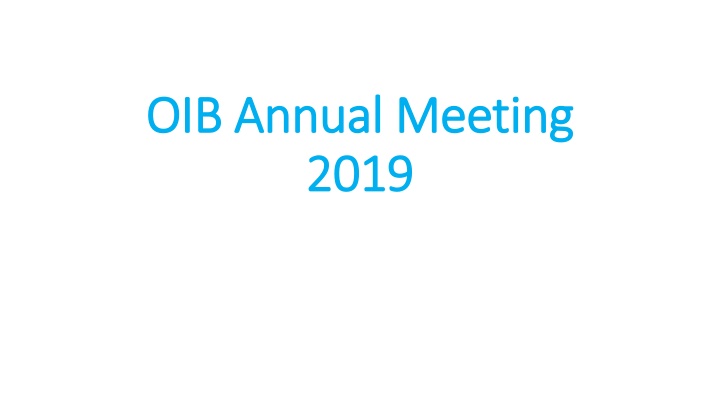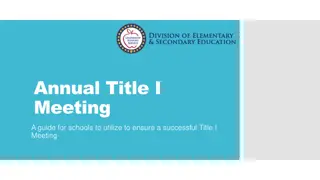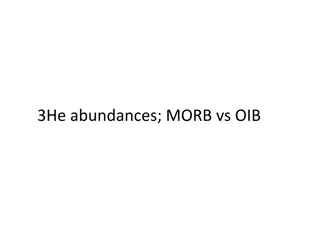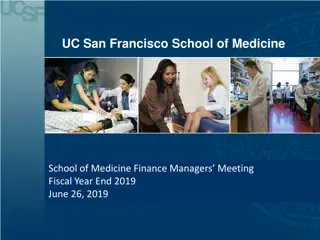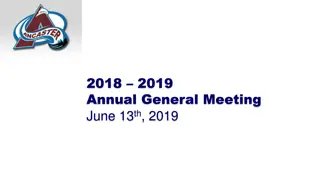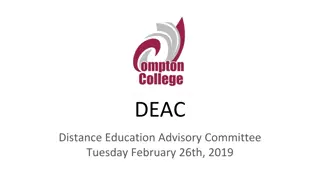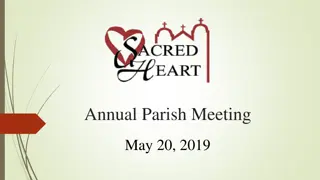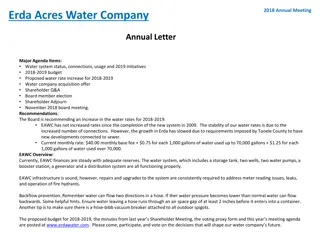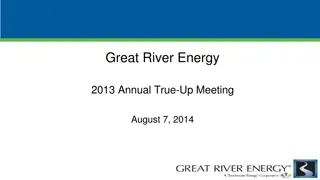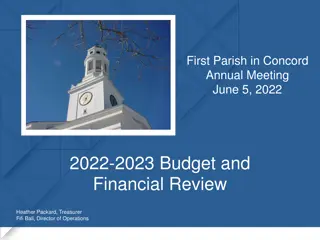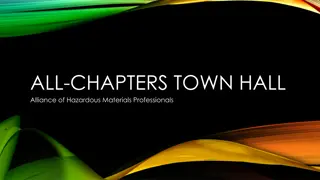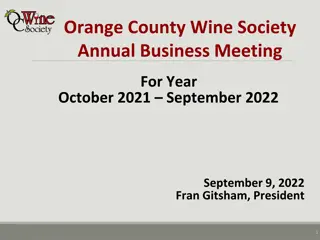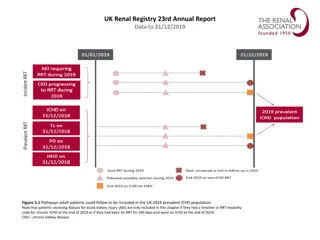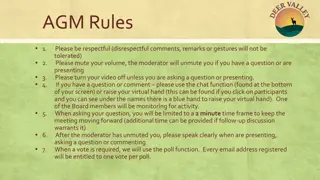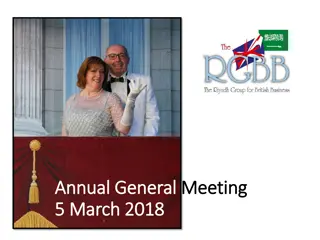Highlights from OIB Annual Meeting 2019
The OIB Annual Meeting 2019 showcased reports on written papers, oral examinations, insights into the inspection process, and comparative statistics. The performance analysis of the written paper, marking process challenges, and key statistics from the exams were discussed. Explore the detailed account and outcomes of the meeting in this comprehensive collection of images.
Download Presentation

Please find below an Image/Link to download the presentation.
The content on the website is provided AS IS for your information and personal use only. It may not be sold, licensed, or shared on other websites without obtaining consent from the author.If you encounter any issues during the download, it is possible that the publisher has removed the file from their server.
You are allowed to download the files provided on this website for personal or commercial use, subject to the condition that they are used lawfully. All files are the property of their respective owners.
The content on the website is provided AS IS for your information and personal use only. It may not be sold, licensed, or shared on other websites without obtaining consent from the author.
E N D
Presentation Transcript
OIB Annual Meeting OIB Annual Meeting 2019 2019
Report on the Written Paper and the Oral Examinations
The Inspectors Cut 2019
For the Written Paper Read my report. It s full of good stuff really!
For the Oral Exams There is quite a lot to say that is not in my report.
The Written Paper June 2019 The Graph taken from Viatique;
Written Paper 2019 Comparative Statistics Statistic 2017 No of Entries 1287 Mean mark 13.17 Range of marks No of full mark scripts Pass percentage Under 10/20 12.5% 2018 2019 1380 13.12 3 - 20 1239 13.52 0 20 2 - 20 25 (1.9%) 14 (1.0%) 18 (1.5%) 87.5% 91.4% 89.5% 8.6% 10.5%
The Written Paper June 2019 The performance of each question based on a 12% sample; Question Percentage uptake 29% 21% 50% Mean mark 13.8 16.4 13.8 History Essay 1 (Isolationism) History Essay 2 (Thatcher) Geog AMQ (Hubs and flows of globalisation) Geog Essay 1 (Megacities) 24% 26% 50% 13.4 14.2 12.9 Geog Essay 2 (Pop structure) History DBQ (China Post 1949)
Marking the Written Paper The schedule was very tight this year: Exam date 7thJune Scanning completed by 13thJune (6 days) Marking deadline 21stJune (7 days) Moderation deadline 28thJune (7 days) But AG helped by reducing the allocation of scripts.
Marking the Written Paper The main problems were: The tightness of the schedule The late completion of the scanning The large number of new, inexperienced markers Changes to the Viatique online marking platform Access to foreign scripts for moderators Overlap with moderation of written paper and the oral exams Late notification of the variable moderation deadlines
Marking the Written Paper Despite these problems, marking went well this year Four exemplar marked scripts were provided for the markers at the start of marking to help to standardise the marking New for this year only the new markers were given early feedback on three of the first scripts they marked. There were too many markers to do this for everyone
Marking the Written Paper The team leaders were kept busy responding to queries from members of their teams. This is good and shows how conscientious our markers are Most markers applied the mark schemes consistently but a few scalings were required Reports from the written paper markers were mostly positive
Marking the Written Paper Estimated grades were useful but not always that accurate Marking and moderating was completed on schedule an amazing feat considering the short time scale The markers and moderators deserve thanks and praise well done!
Improving Your Students Exam Performance
Improving Students Exam Performance The OIB H/G exam is a very special examination. It contributes to a much larger French Assessment but it is not a French exam. This makes it hard for you and your students (and your French colleagues who teach the course). You need to spend some time explaining this to your students.
Improving Students Exam Performance My advice is the same as last year, and includes: Layout of the answers to make them easy to mark Responding precisely to the command words Making sure evaluation is clearly included where necessary Keeping structure clear and obvious I will produce a short document on this that can be sent out to you all.
Improving Students Exam Performance The generic mark scheme is very helpful. You should study it carefully because it outlines the aspects of an answer that are being assessed (the assessment objectives). Use it in your marking throughout the year.
Improving Students Exam Performance The key assessment objectives are: Knowledge Understanding Analysis, evaluation and judgement Interpretation and use of sources/documents Map drawing skills Devising and structuring an answer
The Oral Examinations The orals are a very valuable aspect of the OIB assessment. They test assessment objectives that the written paper cannot test. The organisation of the orals is a major task and I am always amazed at how smoothly it all seems to run. The success of the oral exam schedule is due to the professionalism of all involved.
The Oral Examinations However, as Cambridge Inspector, I find the orals more difficult to check for reliability than the written exam, despite the sterling work of the Assistant Moderators This is partly due to the greater potential for variability in the orals, making the schools estimated grades less reliable
The Oral Examinations The variables appear to include: The ability of the students The teaching of the topics The preparation of the students for the exam The students selection of Key Issue and Key Term The way in which the oral exam develops the interaction between the student and the examiners
The Oral Examinations As Inspector, my concerns are as follows: The fiches give me no real information about what happened in each of the oral exams I just have to check the addition of the three marks. Schools estimates are not always reliable but many are. All written paper markers are checked but only 25% of oral examining pairs were inspected in 2019 a typical figure.
The Oral Examinations As Inspector, my concerns are as follows: 19.5% of the written paper scripts were moderated (re-marked) by the inspector and/or the team leaders. Only 1.7% of the oral exams were seen by the inspector. However, the work of the Assistant Moderators helps me a great deal. Overall, they do a great job to ensure consistency.
The Oral Examinations But I still have a problem. What can I do when I receive a set of marks that are significantly and consistently different from the School s estimates? What checking, what quality control can I use? What evidence can I collect to justify changes to the marks?
The Oral Examinations This is what I like to see; These are actual marks against estimates i.e. +3 means the actual mark was 3 marks higher than the school s estimate
The Oral Examinations But this does not always happen so I have to consider the following: The school s oral estimates compared to the national oral estimates The school s oral estimates compared to the school s exam estimates The school s exam estimates compared to the school s exam results The school s H/G oral estimates compared to the school s Lang/Lit oral estimates
The Oral Examinations The school s H/G oral results compared to the school s Lang/Lit oral results The oral results v. estimates for other centres examined by the same examiner pair An email to the relevant AM, asking for their opinion of the examiner pair I am always reluctant to change marks without some sort of evidence for the change but the above strategies often give me that evidence.
The Oral Examinations This year I did make changes for example: As a result of extreme heat in the exam room I was alerted by the AM. Where marks lower than 6/20 were awarded and no reason was given on the fiche Where students had consistently been awarded marks significantly below the school s estimates and where the school s estimates were in line with the national average and where the other evidence suggested the marking was too harsh.
The Oral Examinations In one example of the last point above, the situation was as follows: 86% of the marks awarded were below estimate 16% of the marks were below estimate by a significant amount So what did I do? The marks were scaled upwards to bring them more closely into line with the school s estimates.
The Oral Examinations So, why do examiners (and even AMs) sometimes get it wrong? My theory is as follows; They work in good schools with very good students They are quite clear about the standard in their own school However, when presented with students who are not quite so good, they recognise that they are weaker but then mark them down far too much I have seen this before; last year in the OIB, previously in other syllabuses, and in other types of assessment
The Oral Examinations So, what can we all do to ensure greater reliability? Reflect on our own standards do they need refreshing? Study the training videos when they become available Attend an oral training meeting in the New Year Make sure we are all aware of what is good practice
The Oral Examinations What is good practice ? Make sure the centre is properly organised Make sure the room is properly organised Discuss strategies with your partner before the exams start Make sure the student s choice of topics is recorded correctly Make notes but pay attention to the student s presentation
The Oral Examinations Ask an easy opening question Ask open questions and avoid closed questions If possible, base questions on what the student has included in their presentation Try to ask mainstream questions at least to start with Adjust questioning difficulty in line with what you are starting to feel is the student s ability push the able so that they can achieve the higher levels If the student can t answer a question, don t persist too much help them out of the hole
The Oral Examinations Challenge the student, where appropriate, but don t get in their face Give the student time to answer but try to keep the discussion moving Make sure both of you are involved In the post-oral discussion, don t base your marks on what you think the student should have said. Mark what the student did say. Other teachers may teach a topic differently from you. Be positive in your marking
The Oral Examinations Don t be dominated by your partner, especially if they are more experienced make sure you make your opinion felt Always find time to go back and review your marking in the light of later students performances. There is a tendency to be too harsh when marking the first one or two students in a session.
The Oral Examinations What can JN, AG and senior colleagues do to ensure greater reliability? Re-write the guidelines for oral examiners Produce a list of good practice Tweak the marking criteria to make them clearer Ask for more student specific information on the fiches. There is room for a brief comment near the bottom of the sheet. This may become mandatory for a mark below 10/20 Marks below 6/10 should not be awarded unless the oral was incomplete
Some General Points in Conclusion
Some General Points All topics from the syllabus can appear on the written paper, and in any combination The Geog AMQ is now an established option but there will be no pattern in terms of when it is used So I need plenty of AMQ questions and Geog DBQ questions Avoid repetition of questions that have appeared in the last two years but repeating the topic is OK
Some General Points It is really important that the students write their Cambridge number on each page of their answer booklet If there is a Geog AMQ, students must write their name and Cambridge number on both sides of the tear-out sheets and ensure that these sheets are added to their answer booklet
Some General Points When preparing students for the exam, mark schemes are more important than past paper questions The generic mark scheme is much more useful than the indicative content because it shows the type of answer that will gain high marks
Some General Points I know how tight the allocation of teaching time is but try and put some time aside to teach examination technique as well as the syllabus content.
Do You Have Any Questions?
